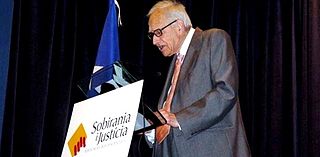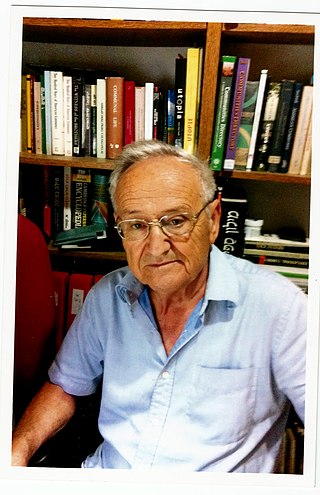Related Research Articles
A utopia typically describes an imaginary community or society that possesses highly desirable or near-perfect qualities for its members. It was coined by Sir Thomas More for his 1516 book Utopia, which describes a fictional island society in the New World. It can also refer to an intentional community.
Utopian and dystopian fiction are subgenres of science fiction that explore social and political structures. Utopian fiction portrays a setting that agrees with the author's ethos, having various attributes of another reality intended to appeal to readers. Dystopian fiction offers the opposite: the portrayal of a setting that completely disagrees with the author's ethos. Some novels combine both genres, often as a metaphor for the different directions humanity can take depending on its choices, ending up with one of two possible futures. Both utopias and dystopias are commonly found in science fiction and other types of speculative fiction.

University of Rovira i Virgili is located in the Catalan cities of Tarragona and Reus, Spain. Its name is in honor of Antoni Rovira i Virgili.
Oenology is the science and study of wine and winemaking. Oenology is distinct from viticulture, which is the science of the growing, cultivation, and harvesting of grapes. The English word oenology derives from the Greek word oinos "wine" and the suffix –logia the "study of". An oenologist is an expert in the science of wine and of the arts and techniques for making wine.
Ruth Levitas is Emeritus Professor in the Department of Sociology at the University of Bristol. She is well known internationally for her research on utopia and utopian studies.
The SGroup - Universities in Europe network (SGroup), previously called Santander, is a non-profit association of universities incorporated in Spain. It was founded in 1992.

Eudald Carbonell i Roura is a Spanish archaeologist, anthropologist and paleontologist.

Géza Alföldy was a Hungarian historian of ancient history.

2894, or The Fossil Man is an 1894 utopian novel written by Walter Browne published in New York by G. W. Dillingham. It is one entrant in the major wave of utopian and dystopian literature that characterized the final decades of the nineteenth century.
Spensonia is a fictional Utopian country created by the English author and political reformer Thomas Spence. Spence laid out his ideas about Spensonia in a series of literary works published in the late 18th century:
Gregory Claeys is Professor Emeritus of History at the University of London.
Kenneth Morrison Roemer, an Emeritus Professor at the University of Texas at Arlington, an Emeritus Fellow, UT System Academy of Distinguished Teachers, and a former Piper Professor of 2011, Distinguished Scholar Professor, and Distinguished Teaching Professor at the University of Texas at Arlington. He is the author or editor of four books on utopian literature, including The Obsolete Necessity (1976), nominated for a Pulitzer, and three books on American Indian literatures, including the co-edited Cambridge Companion to Native American Literature (2005). His collection of personal essays about Japan, Michibata de Dietta Nippon (2002) (A Sidewalker’s Japan), was a finalist for the Koizumi Yakumo Cultural Prize. He is the project director of a digital archive of tables of contents of American literature anthologies Covers, Titles, and Tables: The Formations of American Literary Canons.

Antoni Maria Badia i Margarit was a Catalan linguist and philologist who produced works on the grammar and history of the Catalan language. He was born in Barcelona.
Anthony David Pym is a scholar best known for his work in translation studies.

Yaacov Oved is a historian and Professor Emeritus in the Department of History at Tel Aviv University, member of Kibbutz Palmachim, research fellow at Yad Tabenkin: the institute of research and documentation of the kibbutz movement, researcher of the history of communes in the world and co- founder of the International Communal Studies Association.
Thomas Patrick Moylan is an American-Irish academic, literary and cultural critic, Professor Emeritus in the Department of Language, Literature, Communication and Culture at the University of Limerick. Moylan's academic interests are in utopian studies and critical theory, science fiction studies, cultural studies, American studies, and Irish studies.
Utopian studies is an interdisciplinary field of study that researches utopianism in all its forms, including utopian politics, utopian literature and art, utopian theory, and intentional communities. The term utopia was created by Sir Thomas More in a book with the same name in 1516. Utopian studies can be subdivided into three major parts: study of utopian works, communitarianism and utopian social theory.
Lyman Tower Sargent is an American academic and professor emeritus of political science at the University of Missouri-St. Louis. Sargent's main academic interests are in utopian studies, political theory, American studies and bibliography. He is one of the world's foremost scholars on utopian studies, founding editor of Utopian Studies, serving in that post for the journal's first fifteen years, and recipient of the Distinguished Scholar Award from the Society for Utopian Studies. Sargent was educated as an undergraduate at Macalester College and as a graduate student at the University of Minnesota.
The Society for Utopian Studies is a North American interdisciplinary association devoted to the study of utopianism in all its forms, with a particular emphasis on literary and experimental utopias.
José Luis Domingo is a Spanish toxicologist and distinguished professor of toxicology at Rovira i Virgili University.
References
- ↑ "Home". utopian-studies-europe.org.
- ↑ "Home". newlanark.org.
- ↑ For example: P. Gallardo and E. Russell (eds) Yesterday's Tomorrows: On Utopia and Dystopia Cambridge Scholars Publishing, Newcastle upon Tyne, 2014; A. Blaim and L. Gruszewska Blaim (eds) Spectres of Utopia: Theory, Practice, Conventions Peter Lang, Frankfurt am Main, 2012.